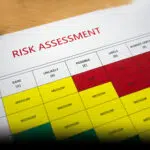RISK AWARENESS WEEK (RAW) takes place takes place from October 7 to 11 this year. RISK AWARENESS WEEK is a global celebration dedicated to recognizing the power of informed and intelligent risk management for achieving success in our personal and professional lives. This week-long celebration highlights the importance of understanding potential challenges, making informed decisions, and fostering a culture of preparedness.
RISK AWARENESS WEEK 2024 is a reminder that being risk-aware is not about being afraid of the future. It’s about being prepared, making informed decisions, and embracing the opportunities that come with calculated risk-taking. Let’s celebrate the power of AI in decision making!
History of Risk Awareness Week
So you may be wondering, what exactly is risk awareness and how can we access it? According to several sources, risk awareness is the recognition and assessment of potential risks and their possible impacts, and how they can be managed.
The risk management process teaches us how to recognize and identify risk, as well as how to design risk responses using risk management tools and methodologies. It was established as a scientific field about 30 to 40 years ago. Since then several methods have been deduced to manage risk. Though risk management as a scientific field is less than half a century old, it’s been around for longer than 2,400 years. The Athenians assessed risks to the best of their capabilities before making decisions.
In the 1970s and 1980s, more advanced analysis techniques became available, and since then, improved procedures have been developed. The necessity of raising awareness has become increasingly obvious in recent years, which is why programs like RISK AWARENESS WEEK are so vital. The dangers that our modern society face are becoming increasingly complicated. If you’re a non-risk professional, or part of an organization that is quite unfamiliar with these concepts then this week will benefit you.
Risk Awareness Week timeline
Two famous mathematicians Pascal and Fermat write to each other about different games of chance — these letters are believed to be the origin of the probability theorem.
Actuaries are those who accumulate and analyze statistics in order to determine insurance risks; the earliest ones begin to appear in England.
Following the Second World War's losses, risk management becomes more prominent as risk managers look for additional ways to maintain safety, such as through training programs and other similar initiatives.
The Risk Awareness Week initiative is developed with the aim of raising awareness.
Risk Awareness Week FAQs
How can we improve risk awareness?
There are several ways we can improve risk awareness. We can start by educating all our employees on how to better manage and mitigate potential risks, and communicate what preventive methods can be taken.
What is risk acceptance?
This is when a business person or institution acknowledges there are risks but the potential loss is not great enough to spend money to prevent it. It is also known as “risk retention.”
What are risk environments?
This is the social or physical space in which a diversity of components may increase the chances of harm, most likely induced by the environment. Some examples include radiation, toxic waste, heavy metals, pesticides, e.t.c.
Why Celebrate Risk Awareness?
Informed choices
Risk Awareness Week encourages us to move beyond fear or blind optimism, empowering us to make calculated decisions based on a clear understanding of potential risks and rewards.
Building resilience
This month, there is most likely going to be an abundance of information about risk awareness and management. So, if you're interested in knowing about risks and decision-making, this is your opportunity to educate yourself and heighten your level of awareness.
Driving innovation
A proactive approach to risk management allows us to take calculated risks essential for innovation, progress, and seizing new opportunities.
Fostering collaboration
Risk Awareness Week promotes a shared mindset focused on identifying and mitigating collective risks, creating a foundation for success across industries and communities.
5 IMPORTANT RISK MANAGEMENT FEATURES
Risk managers need to be taken seriously
Risk managers should have senior leadership in any organization — this sets a tone of importance for all the staff and gives those in charge the necessary authority.
Risk management systems should be flexible
There are new methods of risk assessments every day and for this reason, companies should be willing to adjust their practice when the need arises.
The data received has to be reliable
Be it through external sourcing or internal analysis of a community or company, all data concerning risk management must be credible.
Risk factors should be considered everywhere
From Silos to hospitals the safety of employees should be a priority in every organization and there should be frequent communications
Bigger organizations have higher risks
Institutions with bigger volumes in staff numbers and capacity have reasons to be wary and take necessary measures to ensure efficient risk management.
How You Can Get Involved in RAW 2024
Learn something new
Explore the concepts and tools behind effective quantitative risk management. There are online resources, webinars, and even local workshops available.
Share your knowledge
Mentor someone who is new to risk management or discuss risk awareness concepts with your team or social circle.
Celebrate success stories
Highlight individuals or organizations demonstrating excellent risk management practices that have led to positive outcomes.
Risk Awareness Week dates
| Year | Date | Day |
|---|---|---|
| 2024 | October 7–11 | Monday–Friday |

